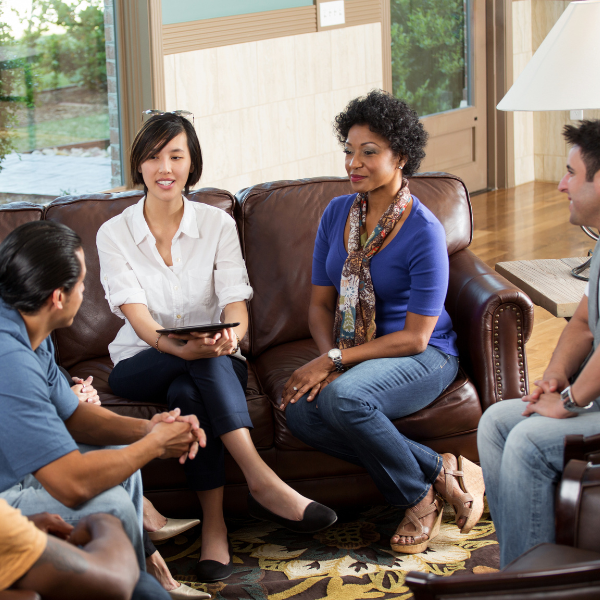Group Therapy
Group therapy is a powerful way to help people improve their confidence. Many of the most common issues people seek support for, such as anxiety, depression, low self-esteem, and body image concerns, are linked to concerns over how others will perceive us and whether they will accept us. Oftentimes people who have had negative experiences with others expect to continue to be hurt in different ways in their relationships. Participating in a therapy group helps them have more positive, validating experiences that shifts what they see as being possible for themselves with others.
How does group therapy help?
There are numerous ways that joining a therapy group can help people dispel negative beliefs they have about themselves and others, and feel more empowered to cultivate the types of relationships they seek in their lives. These include:
- Learning How to Be Vulnerable: People exist in the bind of needing the care of others yet fearing they will be rejected if they try to seek it. For many people this leads them to keep their needs inside, suffering silently. Group therapy gives them a chance to practice opening up in a supportive environment in order to learn that others are both capable of willing to help meet their needs.
- Practicing New Behaviors: To protect themselves from being hurt, many people are reluctant to engage in certain behaviors that feel uncomfortable, such as self-assertion and self-disclosure. Unfortunately this reluctance also contributes to their feeling dissatisfied in their relationships. In group counseling they can practice and become comfortable with the types of behaviors that help to build close relationships.
- Receiving Feedback: Sometimes people feel both frustrated and discouraged that they are struggling to connect with others but don’t understand why. In group therapy they can receive feedback about what helps other people feel closer to them, as well as what types of behavior may be tripping them up in their relationships. They also have the opportunity to provide others with feedback.
- Feelings of Universality and Belonging: Oftentimes people enter therapy ashamed of their struggles, and feel like everyone else has got it all figured out. When they begin a therapy group they often expect to be rejected for their issues, only to find that other members are more apt to relate to their challenges and try to support them than to judge them . Over time this can foster powerful feelings of acceptance and belonging that relieve symptoms and make it easier to anticipate being accepted by others as well.

What can I expect in group therapy?
Therapy groups are small, typically comprising five to eight members. They meet weekly and are led by either myself or myself and a co-therapist. Members are added after I have had the chance to assess that they would benefit from joining a group.
Frequently people will start treatment with individual therapy and begin group therapy later as they are feeling motivated to build their confidence and practice deepening their relationships. Sometimes people will do a combination of individual and group therapy, while other times they may transition to participating in a group as a standalone treatment. To learn more about whether joining a therapy group is right for you, reach out and let’s talk about whether doing so can help you achieve your goals and feel better.
